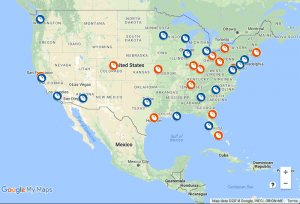You can work in California for up to 12 days in a row without having a day off. Here`s how it falls apart: California employees are entitled to a day off in a work week. The work week can start on any day of the week. For example, if your work week lasts from Monday to Sunday, your rest day may be monday in the first week and Sunday in the following week. See this table for an illustration. Non-exempt workers are generally entitled to overtime pay if they work more than eight hours in a single workday. Alternatively, non-exempt workers are generally entitled to overtime pay if they work more than 10 hours on a single working day on an alternative weekly schedule. (As explained in section 1.6 above, alternative work weeks typically include four working days of 10 hours each.) Example: Moe`s work week starts on Monday and ends on Sunday. At one point, Moe works eight hours on Wednesday, Thursday, Friday, Saturday, Sunday, Monday, and Tuesday: Although Moe worked seven days in a row, the last Monday and Tuesday fell on a different work week than the previous five days. Therefore, Moe is not entitled to overtime pay based solely on the work of seven consecutive employees. Under article 554, workers are not necessarily entitled to one day of rest over a period of seven days. Instead, they are entitled to a six-day off each, during which they work in the same calendar month. 1) In a week, Bill`s work schedule from Monday to Saturday is five hours a day, except on Tuesdays, he works nine hours.
Employees are entitled to overtime pay and a half if they work more than eight to 12 hours per working day. Since Bill worked nine hours on Tuesday, he should receive eight hours of regular pay plus one hour 1.5 times overtime pay: Every employer who has done business in California knows the state`s Byzantine wage labor laws and immense responsibility for even minor violations. The complexity of these laws – and the potential exposure of employers – has not escaped the attention of the Ninth District Court of Appeals, as evidenced by the recent case of Mendoza v. Nordstrom. There, the Ninth District sought advice from the California Supreme Court on three issues related to California`s rarely judged “day of rest.” Normally, the hours used to calculate the normal rate of pay cannot exceed the legal maximum working time, which in most cases is 8 hours per working day and 40 hours per working week. This maximum can also be influenced by the number of days you work during a work week. It is important to determine what maximum is legal in each case. The alternative method of planning and calculating overtime under most Industrial Welfare Board wage orders, which is based on an alternative weekly schedule of four 10-hour days or three 12-hour days, does not affect the regular wage rate, which in this case would also be calculated on the basis of 40 hours per work week. You can either file a wage claim with the Division of Labor Standards Enforcement or take legal action against your employer to recover the lost wages. If you no longer work for this employer, you can also claim the waiting penalty in accordance with Article 203 of the Labour Code. Note that hours worked include not only the time you spent at work, but also the following: If you read this and you say to yourself, “My employer has scheduled me for the next nine days, a day off, and then 10 days again. I have a workers` dispute! Think again.
The Labour Code prescribes one of the seven days of rest. All employees deserve a day off, even if they only work a few hours a day. However, if you work six to eight hours a day and don`t get a rest day for the seven working days, you may have a case of violation of workers` rights. However, it does not specify when this day of rest is to take place. Section 554 gives employers flexibility on how to offer these days off, which could be responsible for your crazy 10 days off. Employees who have to pay overtime can file a complaint with the Labour Commissioner. Alternatively, employees can sue their employer for unpaid wages and attorneys` fees. In most places in California, employers can change an employee`s work schedule without notice.
It`s not going well, but there`s no law that requires employers to make schedule changes within a certain amount of time. .


